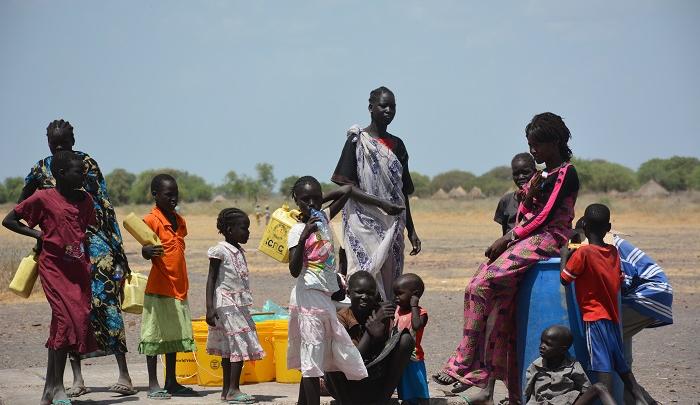
JUBA, South Sudan—(May 19, 2014) – As the conflict in South Sudan rages on, several years of critical gains are at stake for the world’s newest country, and children’s lives hang in the balance, a new report warns today.
Prior to the December 2013 violence outbreak, improvements in food security, education, health and other basic infrastructure pointed to a brighter future for the fledgling nation.
In October of 2013, Sudan and South Sudan had just finalized an agreement to simplify cross-border trade which would have increased economic activity for South Sudan. After a successful harvest season last year, most areas of South Sudan were expected to experience minimal food shortages this year, and with the increased local food production, grain prices were expected to remain stable.
However, with the escalation of violence the past several months, these improvements are quickly unraveling. Conditions are now dire in South Sudan with children hungry and displaced, and will only get worse unless urgent measures are taken to reverse a rapidly deteriorating situation, says World Vision’s report Sounding the Alarm: The desperate plight of children in South Sudan.
“The situation in South Sudan is not a hopeless one, but this new nation desperately needs the international community to take notice before that hope is lost,” said Perry Mansfield, National Director of World Vision in South Sudan. “The meeting of governments in Oslo tomorrow is the opportunity for funds to be pledged to avert a humanitarian catastrophe.”
Almost a quarter of a million children will be severely malnourished by the end of the year, and up to 50,000 children under 5 may die if treatment is not scaled up immediately, the report notes.
Today, almost four million people in South Sudan are facing exceptional levels of food insecurity following an outbreak of fighting in mid-December. In addition to facing hunger, more than 500,000 children have fled their homes, where they survive in makeshift camps or overcrowded sites established by the United Nations Mission in South Sudan (UNMISS). Thousands of children have lost or been separated from their parents while fleeing violence.
Displaced children who spoke to World Vision staff complained of the daily stress of being constantly on the move to escape fighting and of trying to find enough food and water to survive.
One child, identified as ‘Simon’ in the report, related crossing a river during his own dramatic flight from home: “If you couldn’t swim you drowned. Many children were screaming and drowning, but you have to keep swimming for your own survival. Can you imagine? Now we are here, and look at us.”
The report says such children are especially vulnerable to recruitment by armed parties in the conflict and physical and sexual violence. According to the United Nations, all parties to the conflict have committed brutal acts of sexual violence against civilians, including young children. These include rape at gunpoint, gang rape, sexual slavery and forced abortion. Children could face even more violence as tensions rise in overcrowded sites on UN peace-keeping bases.
The report says the onset of the rainy season will only make things more difficult. Once heavy rains start in June, many of South Sudan’s dirt roads become inaccessible, making humanitarian organizations like World Vision dependent on costly air operations to transport supplies.
Already, hostilities have severely impeded efforts to pre-position supplies along key transport routes.
“We are in a race against time to save lives,” says Mansfield.
Despite the grim picture, the report argues that there are concrete measures that donors, the United Nations, humanitarian organizations and parties to the conflict must take to avert further calamity and restore hope.
Among numerous recommendations, the report calls for donors to scale up funding for aid operations, including funding for food aid and child protection. It urges UNMISS to relieve overcrowding in Protection of Civilian sites and increase the scope of its patrols to allow humanitarian organizations to reach the most vulnerable in remote areas; and it urges parties to the conflict to honor the agreement signed on May 9, 2014, to immediately end hostilities and ensure the protection of civilians, including children.
Since hostilities erupted in December, World Vision has been addressing needs in the worst-affected areas of South Sudan. Operations include provision of food, nutrition supplements for children, shelter materials and hygiene kits. In addition, it undertakes family tracing and reunification of separated children and runs Child-Friendly spaces—safe havens for children where they can play, learn and recover from emotional scars.
-ENDS-
• The Humanitarian Pledging Conference for South Sudan is being held in Oslo tomorrow, Tuesday May 20 (http://www.regjeringen.no/en/dep/ud/press/news/2014/southsudan_conference.html?id=758334)
• World Vision’s South Sudan program director, Perry Mansfield (American), will be in Oslo to attend the donor conference on May 20.
About World Vision:
World Vision is a Christian humanitarian organization conducting relief, development, and advocacy activities in its work with children, families, and their communities in nearly 100 countries to help them reach their full potential by tackling the causes of poverty and injustice. World Vision serves all people regardless of religion, race, ethnicity, or gender. For more information, please visit www.WorldVision.org/media-center/ or on Twitter @WorldVisionUSA.
Highlights
- 50,000 children may die of starvation without immediate intervention
- Prior to conflict, nation experienced stable trade, successful harvest
- Oslo conference offers opportunity to supply aid before food crisis reaches peak